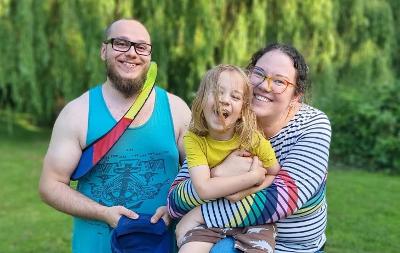Sarah and Chris' story
Sarah loved working with, and seeing young children learn every day in her job as a nursery manager, but when her son arrived, and with health issues that had niggled since childhood worsening during her pregnancy, she started to re-think the whole idea of going back to work.

Together with her husband Chris, the couple came to the idea of fostering, something they'd first through about doing almost a decade earlier. We caught up with Sarah and chatted about the family's fostering journey, Sarah's experiences as a disabled foster carer, and how their son has been involved in the fostering process since day one.

Get a fostering information guide
If you have a disability - explore fostering, see if it can work for you

"Foster care is my main role. My only role. My husband works part time in a local wholesaler, and my son who is six and a half is home educated. So, whatever we do, we do together. Everything is family oriented."
Sarah talks with sadness about losing a job she loved due to the impact of her previously undiagnosed Ehlers-Danlos syndrome (a rare condition that affects connective tissue) which worsened during pregnancy and the frustration she felt at being unable to work. However, her face lights up as she goes on to share how ultimately, not being able to continue in that career path led to "The situation that we are in now, which happily enough was the perfect environment for fostering. So it all worked out in the end."
Asked if she felt any apprehension when looking into becoming a foster carer, Sarah said that any nervousness she had felt, turned out to be unfounded.
"When I found out they send you for a medical as part of the fostering application process I was trying to reassure myself that the way myself and my husband make our own family life work, would work for fostering too. There are times where I'm not very functional, but my husband picks up the slack. We just sort of take things as a team. Obviously, when you have to try and evidence that to professionals that are going through things with a fine-tooth comb, it's a bit of a nerve-wracking. But the fact that it hasn't interfered with my ability to parent was a big part of what the doctor and assessing social workers looked at and said."
Sarah also opened up about previous struggles with her mental health and how the topic was approached during the application process.
I had a history of depression, which is common after struggling to conceive or working through infertility, and that is something that was asked about in the application process. I was devastated to think it would stop us from fostering, but that's absolutely not the case. The social workers were just ensuring I was supported and paying attention to my mental health.
Asked what she would say to other people with disabilities who have considered fostering, Sarah said: "It's amazing how well fostering fits in when your family looks a bit different maybe to other families. But you can still make it work and the little people, aren't any the wiser! Ultimately, I struggled a lot with not being able to work and initially relying on state support, but it ended up creating a perfect circumstance for fostering, and I would definitely encourage more disabled people to explore fostering and see if it can work for them."
Involving birth children in the fostering process
Sarah and Chris had considered becoming foster carers for many years and have now been fostering for just over a year.
Sarah explained "We had our little miracle boy, and when we decided that he'd reached an age where he could communicate really well, and he could have open dialogue with us about it, that it was the right time for us to apply.

For several months leading up to us applying and actually being foster carers, we would ask him how he would feel if a little person came to live with us, so we made sure we knew his feelings on it. When we have a child in placement and they go to family time we always ask our little one if there is anything he wants to do, just the three of us, for us to do during our special time. It's about making sure that he knows he's still getting that one-to-one with us.
Talking about the application process, Sarah commented that social workers spoke to and involved their son in an age-appropriate way to get his views and to help him understand what fostering as a family would be like.
"They had a whole little process for him as well. He would have to answer questions and reflect on what he thinks is going to be difficult, how he feels about sharing us - just sort of getting honest feedback from him."

The family's supervising social worker also has a role in checking in regularly with the youngest member of the family.
In our meetings, our supervising social worker always asks how our son is feeling, how he is feeling about fostering and if things are working. They ask if it's a thumbs up or a thumbs down and how he feels on a scale of one to ten. They are just trying to gauge his response and just make sure that he is not being adversely affected.
And while Sarah pointed out that both parents and professionals take the time to talk to her son, to make sure he continues to be happy and comfortable with their fostering, she believes there "always indicators" that can help foster carers monitor how children in the household are feeling "even if you don't have that open line of dialogue behaviour is their way of communicating."
She explained: "I think if you are on the level of your own little person, and in tune with what they're feeling, they'll show you if they're happy about what's going on."
Find out more
If you'd like to find out more about becoming a foster carer with Foster with North East why not complete our enquiry form? There's no expectations or pressure but the Foster with North East team are on-hand to offer support and answer any questions you may have.




